When it comes to selecting the ideal worktop material for your kitchen, the decision often boils down to Quartz and Marble. Both of these materials exude elegance and luxury, making them highly sought-after choices for kitchen worktops.
However, they have distinct characteristics, advantages, and drawbacks. In this guide, we will conduct an in-depth comparison between Quartz and Marble worktops to assist you in making an informed choice for your kitchen project.
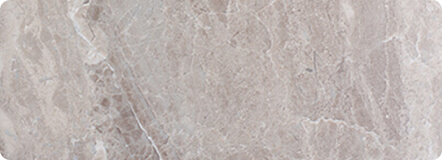
Quartz worktops are engineered stone surfaces primarily composed of crushed natural quartz crystals combined with resins, pigments, and other additives.
While the exact composition may vary among manufacturers, quartz countertops generally consist of around 90-95% crushed quartz and 5-10% resin. This engineered composition results in greater uniformity in colour and pattern.

Marble worktops, on the other hand, are made entirely from natural marble stone. Marble is a metamorphic rock formed from limestone, subjected to heat and pressure deep within the Earth’s crust.
The unique mineral composition of marble gives it its distinctive veining and colouring.
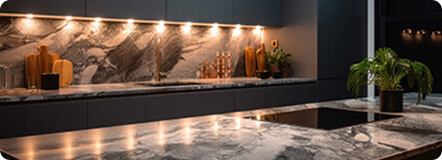
Wide Variety: Quartz worktops offer an extensive range of colour and pattern choices, including solid colours and patterns that mimic natural stones like marble.
Consistency: Engineered quartz provides a consistent appearance, making it easier to match and install multiple slabs seamlessly.
Customisation: Manufacturers can control the final look of quartz, allowing for customised designs and patterns.
Resin Filling: Some people may find the appearance of resin filling on quartz surfaces more noticeable, particularly in certain lighting conditions.
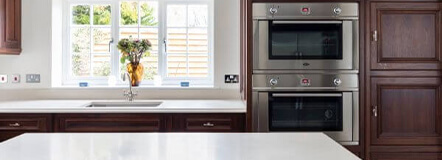
Timeless Elegance: Marble is renowned for its timeless beauty, with unique veining and natural colour variations that add character to any space.
Depth and Luxury: The depth and luxurious appearance of marble are challenging to replicate with engineered materials, enhancing the overall aesthetic of a kitchen.
Natural Beauty: Each marble slab is one-of-a-kind, offering a level of exclusivity that cannot be matched by engineered materials.
Vulnerability to Stains: Marble is more susceptible to staining, and acidic substances like citrus and vinegar can etch the surface if not cleaned promptly.
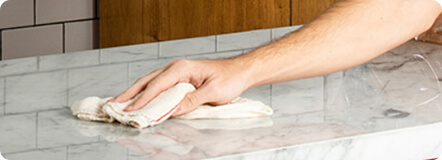
Durability: Quartz is highly durable, and resistant to scratches, chips, and stains due to its engineered composition.
Non-Porous: Quartz worktops are non-porous and less likely to absorb liquids or harbour bacteria.
Low Maintenance: Quartz requires minimal maintenance, usually limited to regular cleaning with mild soap and water.
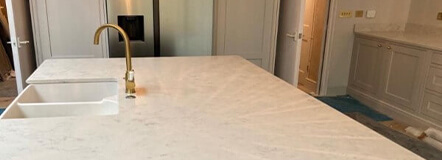
Durability: Marble is relatively durable but more prone to scratching, chipping, and etching compared to quartz.
Porous: Marble is a porous material, which means it can absorb liquids and stains if not properly sealed.
Sealing Required: Regular sealing is essential to maintain the marble’s resistance to staining. Sealants should be reapplied every 6 to 12 months, depending on usage.

Cost Range: Quartz worktops typically fall within a moderate to high price range, influenced by the brand, design, and slab thickness.
Installation Costs: Installation costs for quartz are usually reasonable, as the material is consistent and easier to work with.
Long-Term Value: The durability and low maintenance of quartz can make it a cost-effective choice over time.

Cost Range: Marble worktops vary widely in price, with some exotic or rare marble patterns being significantly more expensive.
Installation Costs: Installation costs for marble can be higher due to the need for precise cutting and sealing.
Value Appreciation: High-quality marble can add significant value to a home, potentially offering a good return on investment.
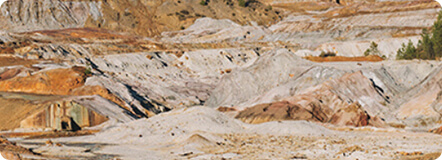
Environmental Concerns: The production of quartz worktops involves the use of resins and other chemicals, which raises environmental concerns.
Sustainability Efforts: Some manufacturers are working to reduce the environmental impact of quartz production by using recycled materials and eco-friendly resins.
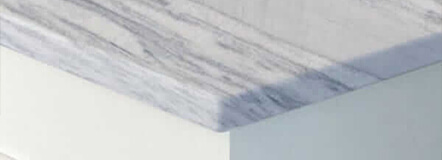
Natural Resource: Marble is a natural stone, and its extraction can have an environmental impact in terms of energy consumption and habitat disruption.
Sustainability: Choosing marble from responsible quarries or opting for recycled marble can help mitigate the environmental impact.

Easier Installation: Quartz is typically easier to install due to its consistent thickness and uniformity.
Minimal Seams: The seam visibility is often reduced with quartz, creating a cleaner look in larger installations.
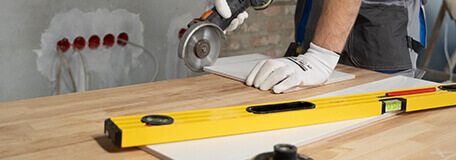
Precision Required: Installing marble demands more precision due to its natural variation in thickness, colour, and pattern.
Seams May Be Noticeable: In larger installations, seams may be more noticeable due to the natural variation in marble slabs.
When it comes to choosing between Quartz and Marble worktops, there is no one-size-fits-all answer. Your decision should be based on your specific preferences, budget, and lifestyle needs.
Ultimately, both Quartz and Marble worktops can create stunning and functional focal points for your kitchen. To ensure a successful outcome, collaborate with a reputable supplier like Topsco, who can guide you through the selection process and provide high-quality materials and installation services tailored to your specific requirements.
Whether you opt for the sleek sophistication of Quartz or the timeless elegance of Marble, your kitchen is sure to benefit from the addition of these exquisite worktops.
Check out our next guide where we compare Quartz and Granite Worktops.
Copyright © Topsco
Developed by TyMedia